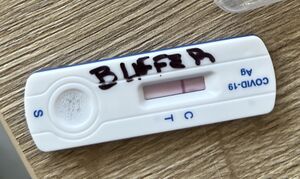COVID tests
This article is a stub. You can help the Personal Science Wiki by expanding it.
| Tool Infobox | |
|---|---|
| Related topics | |
Linked pages on this wiki |
Projects (1), |
COVID tests can identify whether an individual is currently infected with COVID-19. Such testing for infections continues to play an important role in managing the pandemic. There are different types of tests, mainly PCR tests – which are more sensitive but require access to a laboratory and equipment – and rapid antigen tests, which exist both in versions for use by professionals and for home-use.
PCR tests[edit | edit source]
PCR tests are performed using the "polymerase chain reaction" in which a viral target sequence is amplified so that it can be observed as part of the process. Due to this amplification step it is capable of detecting an infection even when the viral load is still comparatively low. But as a consequence these tests require access to laboratories and specialized equipment. As such they are less accessible to individuals and typically require going through pharmacies, doctors or specialized test centers where available.
Rapid antigen tests[edit | edit source]
Depending on the country, these tests can be widely accessible. For example, in France pharmacies and supermarkets sell home-use test kits containing 5 tests for around 15€. Furthermore, many pharmacies perform these rapid tests on the spot. Most of these tests work by taking a nasal swab though there are also some which work by sampling from the mouth.
Typically the rapid tests work by detecting an antigen of SARS-CoV-2 (typically this is the viral nucleoprotein) through the use of antibodies that are present in the test-strip. The test strip itself works through lateral flow immunochromatography. Virtually all of these tests exhibit two signals on the actual test strip, the actual test and a control signal, which indicates whether the test was loaded correctly but not whether the sample was taken correctly.
Sensitivity of antigen tests[edit | edit source]
Compared to PCR tests, the antigen tests are typically less sensitive. This means that they can only pick up an infection at a later stage when the viral load is higher.
The sensitivity of rapid antigen tests varies between manufacturers. In Europe these tests are currently not uniformly regulated, as exemptions were made for getting them to market quickly due to the need for them. Researchers have compared 122 different of these tests that were on the market between September 2020 and April 2021[1]. They found that 26 of these tests exhibited particularly low sensitivity, while 96 of these tests fulfilled the sensitivity criteria of 75% for samples with a high viral load.
The German Paul-Ehrlich-Institute provides a regularly updated list of commercially available antigen tests and their sensitivity in both English and German. The list as a PDF can be found online[2] through the institute's website[3].
References[edit | edit source]
- ↑ Scheiblauer Heinrich, Filomena Angela, Nitsche Andreas, Puyskens Andreas, Corman Victor M, Drosten Christian, Zwirglmaier Karin, Lange Constanze, Emmerich Petra, Müller Michael, Knauer Olivia, Nübling C Micha. Comparative sensitivity evaluation for 122 CE-marked rapid diagnostic tests for SARS-CoV-2 antigen, Germany, September 2020 to April 2021. Euro Surveill. 2021;26(44):pii=2100441. https://doi.org/10.2807/1560-7917.ES.2021.26.44.2100441
- ↑ https://www.pei.de/SharedDocs/Downloads/EN/newsroom-en/dossiers/evaluation-sars-cov2-antigen-tests-overview.pdf?__blob=publicationFile&v=80
- ↑ https://www.pei.de/EN/newsroom/dossier/coronavirus/coronavirus-content.html;jsessionid=4DFD0FC9806C07AB4F01FBEF351FCB5F.intranet231?nn=164146&cms_pos=8
Linked content on this wiki[edit source]
(The content in the table below is automatically created. See Template:Tool Queries for details. If newly linked pages do not appear here, click on "More" and "Refresh".)
| Projects that use this tool |
|---|
| How do controls on antigen COVID tests work? |
| Self researchers who used this tool |
|---|
| Paulina Ejsmont, Maira Goytia, Tim Dobbs, Yann Huon de Kermadec, Gedankenstuecke |
| We talked about this tool in the following meetings |
|---|
| 2022-05-05 Self-Research Chat |
